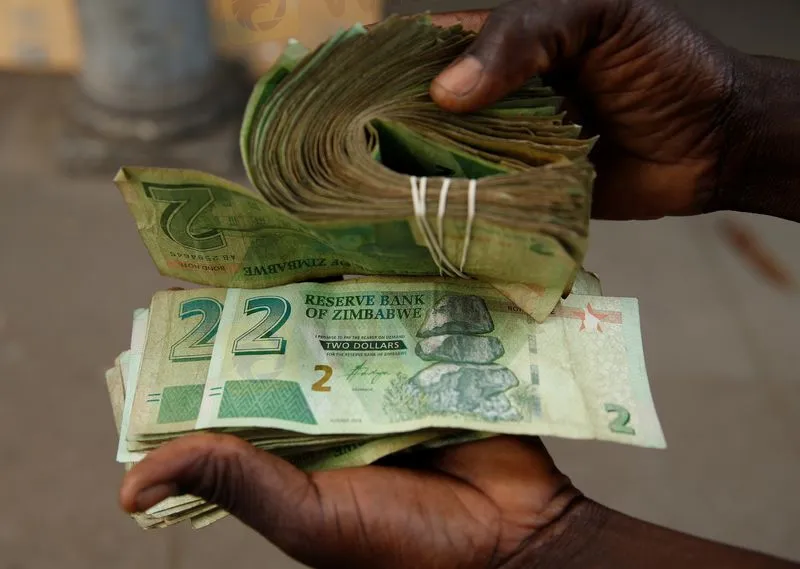简体中文
繁體中文
English
Pусский
日本語
ภาษาไทย
Tiếng Việt
Bahasa Indonesia
Español
हिन्दी
Filippiiniläinen
Français
Deutsch
Português
Türkçe
한국어
العربية
Zimbabwe suspends bank lending in bid to arrest currency decline
Abstract:The devaluation of theZimbabwedollar's black market exchange rate, which is used in most financial transactions in the economy, has been driving up inflation.

Zimbabwe's government on Saturday ordered banks to stop lending with immediate effect in a move Harare said was designed to stop speculation against the Zimbabwean dollar and was part of a raft of measures to arrest its rapid devaluation on the black market.
The southern African country reintroduced a local currency in 2019 after abandoning it in 2009 when it was hit by hyperinflation.
However, the Zimbabwean dollar, which is officially quoted at 165.94 against the U.S. dollar, has continued to slide on the black market, where it is trading between 330 and 400 to the greenback.
The black market exchange rate has moved from about 200Zimbabwedollars at the beginning of the year.
President Emmerson Mnangagwa on Saturday announced measures he said were meant to arrest the currency's depreciation, which he said threatenedZimbabwe's economic stability.
“Lending by banks to both the government and the private sector is hereby suspended with immediate effect, until further notice,” Mnangagwa said in a statement.
He accused unnamed speculators of borrowingZimbabwedollars at below-inflation interest rates and using the money to trade in forex.
Other measures include an increased tax on forex bank transfers, higher levies on forex cash withdrawals above $1,000, and the payment of taxes which used to be charged in forex in local currency.
The devaluation of theZimbabwedollar's black market exchange rate, which is used in most financial transactions in the economy, has been driving up inflation.
Year-on-year inflation quickened to 96.4% in April, from 60.6% in January.
For more Forex news, please download WikiFX- the Global Broker Regulatory Inquiry APP.
Disclaimer:
The views in this article only represent the author's personal views, and do not constitute investment advice on this platform. This platform does not guarantee the accuracy, completeness and timeliness of the information in the article, and will not be liable for any loss caused by the use of or reliance on the information in the article.
Read more

Gold Rate Today in Mumbai and Other Updates on Your Fingertips
After correcting for two straight days, gold rebounded on June 26, 2025, across 24 Karat and 22 Karat categories in Mumbai, the financial capital of India. Check out the latest price update.

CPI Inflation Eased to 2.82% in May 2025 - Check Out the Items Whose Prices Have Fallen
The Consumer Price Index (CPI) inflation dropped to a six-year low of 2.82% in May 2025, falling from 3.16% a month ago. Read this to know the extent of fall across food and non-food items.

Gold & Silver Prices Breach INR 1 Lakh in India - Check Out the Stunning Reasons
India’s bullion market is setting new records with both gold and silver prices breaching the INR 1-lakh mark in spot markets. Read this guide to know the factors that drive the bullion market crazy.

Soft Inflation, Firm Yields: Fed Rate Cut Delayed to Year-End
The U.S. bond market initially rallied on cooling inflation but lost steam as Wall Street bet on later rate cuts. Fed policy expectations now lean toward a December easing, dampening gold and boosting equities.
WikiFX Broker
Latest News
The Dollar Keeps Falling: How Should We View Exchange Rate Volatility?
Asia-Pacific markets rise as investors parse a slew of data releases
Asia-Pacific markets mostly rise as investors parse a slew of data releases
WikiFX Gala Night Malaysia Concludes Successfully
IG Group Unlocks Over £425 Million amid a Capital Reduction
Gold Prices Fall by INR 39,300 in the Last Week? What's Next Week's Outlook?
European stocks open slightly higher as UK-U.S. trade deal cuts autos, aviation tariffs
Treasury yields tick lower as Trump's spending bill in focus
European stocks mixed as UK-U.S. trade deal cuts autos, aviation tariffs
Ripple and SEC Drop Appeals, Bringing 5-Year Legal Saga to a Close
Currency Calculator



